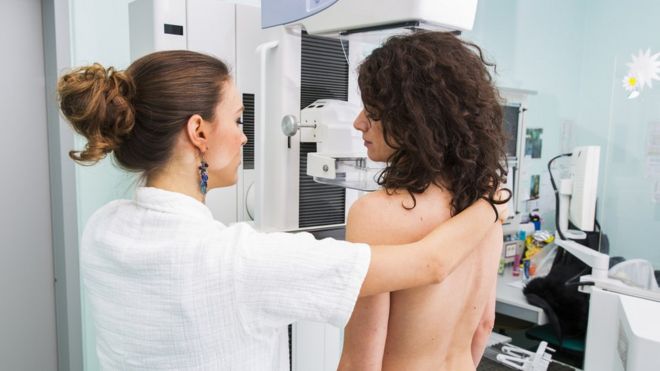Teenager whose breast cancer is faulty with BRCA genes have the same survival chances as those without, a study has found.

The researchers, who shared insight with over 3,000 women, also found out outcomes were the same kind of treatment for women had including mastectomies.
Experts say it means women can take time to decide if the radical surgery is right for them.
The study did not look at preventative mastectomies.
These are offered to women with faulty genes to cut their risk of developing cancer.
Mutations in the BRCA1 and BRCA2 genes increase a woman's risk of breast cancer by four-to-eightfold and can explain why some families have lots of relatives diagnosed with breast cancer.
The study, published in The Lancet Oncology, found 12% of 2,733 women aged 18 to 40 treated for breast cancer at 127 hospitals across the UK between 2000 and 2008 had a BRCA mutation.
What is the BRCA gene?
BRCA has been dubbed the 'Angelina Jolie gene', after the actress revealed she underwent preventative surgery on learning she had an up to 87% chance of developing breast cancer.
Everyone has the BRCA genes, but when a fault occurs in one of them it can result in DNA damage and lead to cells becoming cancerous.
Around 1 in 800 women in the general population are thought to carry the mutation and 5% of women with breast cancer in the UK will have a faulty form of the BRCA gene.
The faulty genes are also linked to an increased risk of ovarian and prostate cancers, as well as breast cancer.
Angelina Jolie had a preventative mastectomy, before she developed cancer. These types of surgery were not examined in this study. The study's author, Professor Diana Eccles, of the University of Southampton, said: "Women diagnosed with early breast cancer who carry a BRCA mutation are often offered double mastectomies soon after their diagnosis or chemotherapy treatment.
"However, our findings suggest that this surgery does not have to be immediately undertaken along with the other treatment."
The women's medical records were tracked for up to 10 years.
During this period, 651 of the women lost their lives from breast cancer, and those with the BRCA mutation were equally likely to have survived at the two-, five- and 10-year mark as those without the genetic mutation.
This was not affected by the women's body mass index or ethnicity.
About a third of those with the BRCA mutation had a double mastectomy to remove both breasts after being diagnosed with cancer. This surgery did not appear to improve their chances of survival at the 10-year mark.
But the researchers said surgery may still be beneficial for these patients to reduce their risk of a new cancer developing in the longer term. CONTINUE READING
SOURCE: BBC


















0 comments:
Post a Comment